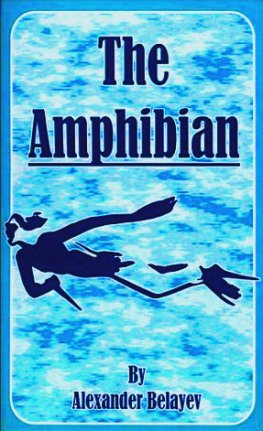Alexander Belyaev
The Amphibian
Translated from the Russian by L. Kolesnikov
Edited by R. Dixon
Designed by Ye. Yudin
.
-
H
First printing 1959 by Progress Publishers
Printed in the Union of Soviet Socialist Republics
MOSCOW
The Amphibian will throw you back to a time when skin and deep-sea diving had not yet made the Silent World begin yielding up its secrets on a really big scale, as aqualung and snorkel are doing today, and present to you Alexander Belyaevs 1928 prevision of the ocean mastered by mankind.
Sea-devil has appeared in the Rio de la Plata. Weird cries out at sea, slashed fishermens nets, glimpses of a most queer creature astride a dolphin leave no room for doubt. The Spaniard Zurita, greed overcoming his superstition, tries to catch Sea-devil and force it to pearl-dive for him but fails.
On a lonely stretch of shore, not far from Buenos Aires, Dr. Salvator lives in seclusion behind a high wall, whose steel-plated gates only open to let in his Indian patients. The Indians revere him as a god but Zurita has a hunch that the god on land and the devil in the sea have something in common. Enlisting the help of two wily Araucanian brothers he sets out to probe the mystery.
As action shifts from the bottom of the sea to the Spaniards schooner The Jellyfish and back again, with interludes in sun-drenched Buenos Aires and the countryside, the mystery of Ichthyander the sea-devil is unfolded before the reader in a narrative as gripping as it is informative.
Alexander Belyaev, the first-and very nearly the best-Soviet science-fiction writer, was born in 1884 in Smolensk. When a little boy Alexander was full of ideas. One of them was to fly. And he did fly from a rooftop until one day he fractured his spine. This was put right, but at the age of 32 he developed bone tuberculosis and was bed-ridden for nearly six years and later for shorter stretches.
After school he studied law and music. To pay for his tuition he played in an orchestra, designed stage settings and did free lance journalism, which he continued after graduation. In 1925 he gave up law and devoted himself wholly to writing.
His first novel, Professor Dowells Head, serialized in a popular magazine in 1926, was an immediate success. Since then A. Belyaev wrote fifty-odd novels many of them as topical as if written today reaching the one-million copy mark by January 1942 when he died near Leningrad (now St. Petersburg). His best known books are The Amphibian, A Jump into Nothingness and The Island of Dead Ships.
The close night of the Argentine midsummer came down on the sea. Stars pricked out in a sky that was a deep violet. The schooner Jellyfish lay quietly at anchor, with not a splash round her, not a creak on board. Ship and ocean seemed in deep slumber.
Half-naked pearl-divers sprawled on the deck. Worn out by the days work under a parching sun they tossed and groaned and cried out in their nightmarish sleep. Their limbs would jerk and twitch; perhaps they were fighting off sharks their deadly enemies. The hot windless weather of which they were having a spell made people so tired that they couldnt even hoist the boats on board at the end of a days work. Not that it seemed necessary: nothing indicated a change in weather. So the boats were left afloat, made fast to the anchor chain. Nobody had thought of tightening the shrouds or sheeting home the jib which fluttered faintly at each stray whiff of wind. From bowsprit to taffrail the schooner was strewn with heaps of pearl shells, pieces of coral, lengths of diving cord, canvas sacks for putting shells in and empty barrels.
Against the mizzen-mast stood a big water barrel with an iron mug on a chain. The deck immediately round was stained dark with spilt water.
Every now and then a diver struggled up and staggered along, sleep-drunk, to the water barrel. Never opening his eyes he swallowed a mugful and dropped down anywhere on his way back, as if it were not water he had drunk but neat spirit. The divers were always thirsty. They went without morning meals, for underwater pressure made diving on a full stomach dangerous, so they worked without eating all through the day, till it grew too dark underwater. They had their meal before turning in-and that was of salt meat.
The Indian Baltasar, right hand of the schooners owner Pedro Zurita, had the night watch.
In his time Baltasar had been known far and wide as an excellent pearl-diver. He could stay underwater for as much as a minute and a half or even two minutes which was about twice as long as an average diver.
How did we do it? They knew how to train in my day and started early, Baltasar would say to the young divers.
Just turned ten I was. My father took me to Jose, who owned a tender, for training. There were twelve of us, all kids like me. And this is the way he trained us. Hed throw a white pebble or shell into the water and order one of us to go and get it. And each time he found deeper and deeper places. If one of us had nothing to show for his diving Josed give him a lash or two of his whip and shove Mm overboard to try again. And it worked. Then he started to train us to keep longer times underwater. An experienced diverd go down and make a basket or piece of netting fast to the anchor chain. Then down we went to untie the knots. And we werent allowed to come up before all the knots were undone. If we did we got the whip again.
The amount of beating we took! Not everybody could stick it out. But it made a diver out of me-and the best in the district. And earned me a pretty penny too.
Then the time had come when Baltasar had to give up the hazardous trade of a pearl-diver. He was no longer young and his left leg bore the terrible scars of a sharks teeth and his side the marks of an anchor chain. He bought a small shop in Buenos Aires and started a trade in pearls, corals, shells and sea curios. But shore life bored him and once in a while he decided he needed a break and put out to sea with pearl-divers.
He was always sure of a welcome, for what he didnt know about the Rio de la Plata and its pearling grounds was just not worth knowing. He was welcomed by all-he knew how to please divers and owners alike. The young divers he taught the tricks of the trade: how to hold their breath underwater and to fight off sharks, and-when in specially expansive mood-how to keep an extra fine pearl out of the bosss sight.
The owners he helped to sort out pearls and evaluate the best.
Baltasar was sitting on an upturned barrel, a thick cigar between his fingers, his face picked out of the darkness by the light of a lantern fixed to the mast. It was an elongated face with a finely cut nose and large handsome eyes the face of an Araucanian. He was drowsing. But even when his eyes were asleep, his ears were not. They registered sounds and gave him warning in the deepest of sleep. There was nothing but the divers sighing and murmuring to hear. The smell of rotting pearl oysters wafted from offshore. It was part of the job: the shell of a dead mollusc opens more easily. What would have been an overpowering stench for an unaccustomed nose was near perfume for Baltasars. For him, a sea tramp that he was it meant all the pleasures and dangers of life at sea.
After the last pearl was extracted the largest shells were brought on board the Jellyfish. Zurita wasnt one to let anything go to waste. He sold the shells to a factory where they made buttons and studs out of them.
Baltasar was asleep. The cigar had slipped from between his fingers. His chin rested on his chest.
A sound from far out at sea broke in on his sleep. Then it came nearer. Baltasar opened his eyes. What seemed to him the blast of a horn sounded again, followed by the cheerful ring of a young voice, repeated after an interval in a higher pitch.














